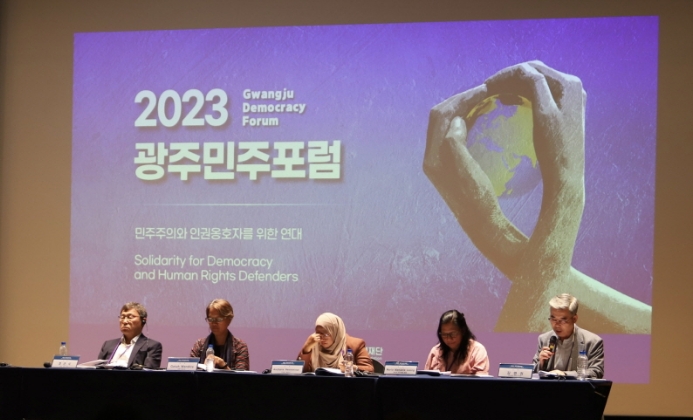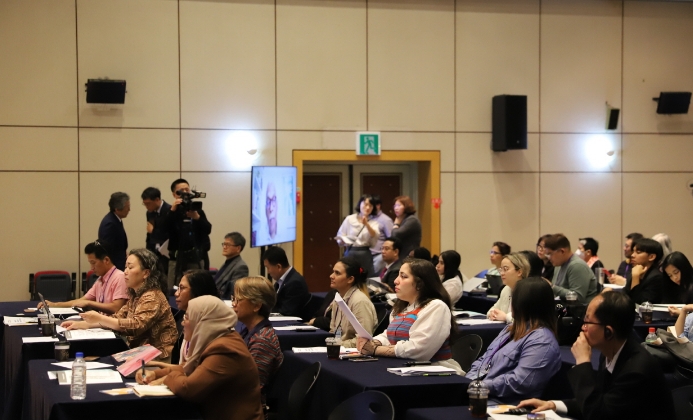Agenda
Agenda
Gwangju Democracy Forum 2024
The Gwangju Democracy Forum (GDF)is an annual international forum organized by the May 18 Foundation to commemorate and inherit the spirit of the May 18 Democratic Uprising in 1980. In 2024, the Forum aims to envision a better future in Korea as well as globally by engaging issues related to democracy, human rights, the climate crisis, poverty, and inequality.


Background
Democracy, human rights, climate justice, and peace are long-time agendas that humanity has been striving to address. The ultimate goal of individual freedom is the expansion of democracy and human rights, as well as genuine progress. Therefore, the suppression of democracy and fundamental freedoms through authoritarianism contradicts the agreed-upon conditions for human life by international society. Despite the valuable lessons learned from the horrors of the world wars in the past century, the recurrence of conflicts in Myanmar, Ukraine, and Gaza, just to name a few, makes it challenging to see hope for a future.
Amid the atrocities that stemmed from World World II, the need for equality and freedom was affirmed. Soon after, ideological conflicts led to the Cold War dividing the globe in which resulted in wealthy nations driven by profit-seeking capitalism and impoverished nations suffering from economic inequality.
Under the theme “Crisis of Freedom – The Future We Want.”, the Gwangju Democracy Forum 2024 will cover three thematic clusters. The Forum will explore how the definition of freedom has evolved and how it is respectively perceived; through this, we will attempt to explore the definition of freedom in today’s world.
In addition, 2024 marks the 30th anniversary of the May 18 Foundation and the release of the final report of the May 18 Democratization Movement Truth Commission. In commemoration, the May 18 Foundation embarked on a two-year project to realize the ongoing process of transitional justice for the May 18 Uprising by conducting research that will analyze the international norms and standards that define transitional justice. Through the analysis, we will look at how these norms contributed to achieving transitional justice in other countries. Importantly, we will also look at how far in the transitional justice process the May 18 movement has come thus far and what tasks are left for the future.
2024 Gwangju Democracy Forum Agenda
Keynote Session
With the many scenes of casualties and destruction of civilization due to the many ongoing wars, humanity is witnessing an escalation of crisis and deterioration of democracy. The prolonged Russia-Ukraine war shows no signs of conclusion, and the Israel-Hamas conflict has sacrificed too many Palestinian lives. Although war rages in the Gaza Strip brought upon an unjustified excessive force by the Israelis, there is much indifference by world leaders. The maritime attack by Houthi rebels in the Red Sea, and Western nations' attacks on the western regions of Yemen, are what unfolded to be a de facto genocide of civilians. Despite this, international institutions, like the United Nations, and global superpowers failed to exert influence and leadership, neglecting humanity and vulnerable countries in crisis.
The climate crisis has recently morphed into a climate catastrophe, with heat waves, killer cold snaps, earthquakes, and floods threatening taking too many lives. The damage to underdeveloped countries that do not have the technology and resources to respond to extreme climates is unimaginable. Despite appeals from the international society, countries and transnational corporations most responsible for pollution contributing to climate change have turned a blind eye to the consequences affecting the most vulnerable countries. Greed has significantly contributed to inequality across the globe. The lack of access to even the most basic conditions necessary to sustain life as a human being has forced freedom and democracy into the corner.
In the keynote session, we will analyze the causes that oppress freedom, such as wars, the climate crisis, the backsliding of democracy, and poverty. Through interactive dialogue with activists, we will assess what efforts are needed to achieve a sustainable and just world.
Thematic Cluster Ⅰ-1 The Future We Want : Global Crisis
We will explore the causes and solutions for the freedom crises discussed in the keynote. We will discuss how international solidarity and global leadership are needed to create a peaceful world free of war. As the debt relief for poor countries, we want to find ways of cooperation for a sustainable future all countries. We will also discuss international solidarity to build a sustainable future where freedom, peace, democracy, and human rights are guaranteed.
Thematic Cluster Ⅰ-2 The Future We Want : We Are the Future!
The past decade has seen civil society and youth activism rise in defense of democracy and human rights across Asia. Actors in Asian pro-democracy movements have evolved into youth progressive forces, making their voices heard in novel ways beyond discourse. We will reflect on and assess the decade of movements such as Hong Kong's Umbrella Revolution, Taiwan's Sunflower Movement, Milk Tea Alliance, and Myanmar's Civil Disobedience Movement. We will invite leading youth activists and explore their visions for the next decade. We look forward to engaging young people from Thailand, Taiwan, and South Korea in an informal discussion about their activism and on being the next new leaders of democracy and human rights in Asia.
Thematic Cluster Ⅱ Election VS Democracy?
This year, 2024, will host elections for more than a billion people in Asia, with major democracies such as India, Indonesia, Taiwan, Bangladesh, South Korea, and Pakistan holding important suffrage. There are some indications, however, which point to the quality of these elections being questionable. The region faces the spread of misinformation, growing polarization, ever-more-turbulent geopolitical headwinds, the growth of technology and social media, and forceful authoritarian influence. In this discussion, we will discuss how such factors contribute to the degradation of the electoral process in Asia and how do we enable reform to ensure that our elections remain have the citizens in their heart.
Thematic Cluster Ⅲ-1 Transitional Justice : International Norms and Trends
Some may say that the truth has been told, reparations have been made, and the issue is now in the past. But in terms of transitional justice, there is still a long way to go. Restorative justice is far from complete, as the perpetrators of the genocide remain unpunished, and distortions of history are still prevalent. Only irreversible justice can prevent similar tragedies from recurring, as we have seen in Latin America and South Africa. We are embarking on a two-year journey towards an irreversible and complete resolution of the Gwangju Uprising. International activists who are collaborating to find resolution to state violence in the past and present will take overseas examples and focus discussions to analyze possible step by step tasks that will bring impact. International norms will be reviewed to see how transitional justice processes have contributed to restorative justice in various countries and how they are currently implementing transitional justice. These findings will then be used to find ways to unpack the unfinished challenges in Gwangju.
The Transitional Justice Session is a permanent topic of the GDF and is co-organized by Asia Justice and Rights (AJAR), a human rights organization that works internationally to implement transitional justice.
Thematic Cluster Ⅲ-2 Transitional Justice : Impunity
This year's GDF will specifically address the issue of impunity, one of the most challenging aspects of transitional justice. Impunity is when atrocities caused by authoritarian states or state organizations are never investigated, and when the truth is revealed, no accountability is asked from the perpetrators. The lack of accountability and, at the minimum, acknowledgment and apology by the perpetrators leaves victims with no way to resolve their resentment and trauma. We hope that the GDF 2024 will highlight the prevalence of impunity in Asia as a case study. The results will lead to international solidarity for those working to implement a transitional justice where bad actors are held accountable.
Special Session Myanmar People’s Movement : We Never Give Up!
The Korean civil society has a long history of showing solidarity for the democratization of Myanmar. In the early 2000s, Korean civil society came together to carry out the “Burma Democratization Movement” calling for democracy and for the military to hand over power to the civilians. The 2021 military coup, brought together the Korean civil society again in which have been carrying out a campaign calling for freedom of Myanmar. This special session, organized by the Institute of Southeast Asian Studies at Jeonbuk National University, will look into the lives of refugees who have fled to the border areas, the current situation in the region, and international solidarity activities in Myanmar.
The day before the session, May 16, we will also screen four short documentaries, specially brought in from the Thai-Myanmar border giving the audience a first glance of the realities on the groud and directly hear the voices of the Myanmar people.
Events Related to the GDF 2024
Ahead of the GDF 2024, the Gwangju Youth Democracy Forum(Y-GDF), comprised of young international students living in South Korea who study democracy, human rights, and peace, will be held on May 14 and 15. After the closing ceremony on May 17, the May 18 Eve Festival will be held at Geumnam-ro, and on May 18, the 44th anniversary of the May 18 Democratic Uprising will be commemorated at the May 18 National Democracy Cemetery. In addition, the Gwangju Prize for Human Rights Award Ceremony will be held on the afternoon of May 18. Participants will be able to experience Gwangju's May besides the GDF.
* Gwangju Prize for Human Rights(GPHR) Award: Since 2000, the May 18 Foundation has been awarding the prize to people (organizations) who have dedicated themselves to democracy, human rights, and peace to commemorate and inherit the May 18 spirit.



 페이스북
페이스북
 블로그
블로그
 트위터(X)
트위터(X)
